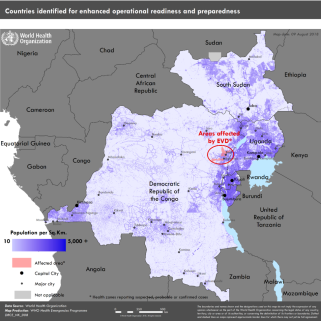Borders &Ebola Bill Brieger | 18 Aug 2019 09:24 pm
Ebola Crisis Takes a Turn: Increased US Intervention Necessary
As part of the course on Social and Behavioral Foundations in Primary Health Care, Allan Ciciriello posted in the class blog. We have shared his thoughts below.

Historically, the 2018 – 2019 Ebola outbreak is the biggest the Democratic Republic of the Congo has ever seen. As a whole, it is also the second largest documented epidemic of the disease on record. The epicenter of the eruption is located in the Kivu region, which has also been in the midst of a conflict between the Congolese military and rebel groups, which has prevented necessary assistance from making its way into the country. Due to the decline of the situation over the past year, culminating with a confirmed case of Ebola in the capital city of Goma, the World Health Organization officially announced it as a Public Health Emergency of International Concern in July 2019.
The spread of the virus to bordering countries is a matter of great importance in the global health community. This includes the nations of Burundi, Rwanda, South Sudan, and Uganda. Given that Goma is a major transportation hub connecting these territories together, it is imperative that the transmission of Ebola be stopped quickly in the Kivu region.

The United States must change its current policies on intervening in the Democratic Republic of the Congo Ebola outbreak. Most important is contributing additional funding to sustain the World Health Organization’s role in halting the spread of the virus within the current borders, while also supporting the surrounding nations’ prevention efforts. USAID is a critical source of backing in this ongoing battle, and without them it is likely to falter. I would also reconsider the hesitancy of placing United States government personnel on the frontlines, because as the problem gets more dire the harder it will be to act from within the country. The CDC is another key player in this game, and I would advise the US take advantage of the United Nations Organization Stabilization Mission in the Democratic Republic of the Condo’s (also known as MONUSCO) peacekeeping forces to get public health workers back on the frontline with guaranteed protection from rebel militias.